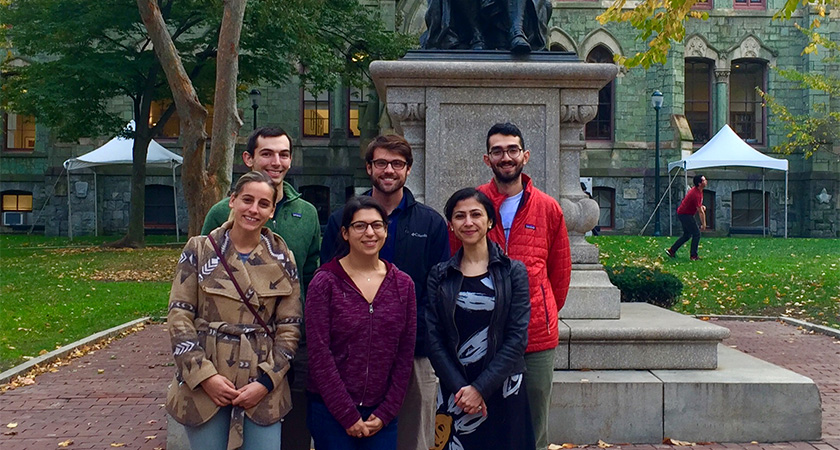
Golnaz Vahedi, Ph.D.
University of Pennsylvania
The Perelman School of Medicine
Department of Genetics
421 Curie Blvd
Office 314, Lab 340
Philadelphia, PA, 19104

Our lab demonstrated for the first time that a transcription factor called TCF-1 has an exceptional property to unwrap DNA from nucleosomes and create open chromatin, establishing the epigenetic identity of T cells (Johnson et al., Immunity, 2018). Strikingly, we found that the ectopic expression of TCF-1 in fibroblasts can unwrap DNA from nucleosomes even at stretches with the most refractory chromatin states, leading to gene expression. Most recently, we extended the role of this transcription factor to the three-dimensional (3D) genome organization (Wang et al, Nature Immunology, 2022). Using high-resolution molecular and optical mapping of the 3D genome, we found that TCF-1 is linked to changes in the structure of topologically associating domains in T cell progenitors that lead to interactions between previously insulated regulatory elements and target genes at late stages of T cell development. To the best of our knowledge, this is the first report describing the role of a transcription factor in dismantling topologically associating domains during a developmental trajectory. Whether other lineage-determining transcription factors act in a way similar to TCF-1 to enable interactions between regulatory elements and the genes required for various developmental pathways remains to be studied. Our ongoing focus on this transcription factor aims to elucidate the precise epigenetic mechanisms through which TCF-1 interacts with chromatin remodeling enzymes and the specific domain of this protein which is required to unwrap DNA from nucleosomes and bend DNA for genome folding, thus leading to a highly orchestrated cascade of gene expression events that drive T cell development and function.
Although the main function of T cells is to protect us from infectious agents, many medically important diseases are associated with abnormal T cell responses directed against proteins produced by our own body’s tissues. This broad category of immune-mediated diseases is referred to as autoimmune disorders and includes diseases such as type 1 diabetes (T1D), inflammatory bowel disease, rheumatoid arthritis, and multiple sclerosis. In the case of T1D, interactions between T lymphocytes and insulin-producing beta cells lead to loss of beta-cell mass and a dependence on exogenous insulin administration for survival. As a drastic departure from the status quo, our laboratory discovered misfolding of DNA at megabase-pair diabetes-susceptibility regions, leading to reorganization of large transcriptionally coordinated regions in a mouse model of T1D as a result of sequence variation associated with diabetes development (Fasolino and Goldman et al, Immunity, 2020). Remarkably, we demonstrated the relevance of these findings to human T1D, thanks to our team efforts in the Human Pancreas Analysis Program (HPAP) at the University of Pennsylvania. Our ongoing work built on transcriptional profiling of beta cells in human T1D (Fasolino, et al, Nature Metabolism, 2022), assessing if and how the genome is misfolded in primary immune cells from pancreatic tissues of individuals with T1D, will not only enable us to devise molecular and optical strategies to detect T1D at critical time points where interventions can delay progression to clinical diagnosis, but is also key for understanding the molecular etiology of this disease. Due to the unprecedented opportunity to work with primary immune cells in pancreatic tissues of more than 100 human organ donors and our ability to work with the mouse model of T1D, our laboratory is at an exemplary position to describe the cause and effect relationships between genetics, nuclear architecture, and gene regulation in T1D.
To achieve our lab’s central goal, which is to better understand the chromatin biology of T cells in health and disease, we also innovate computational techniques to fully understand the complexity of multidimensional epigenomic datasets in T cells. We devised a computational workflow to rigorously detect architectural stripes using computer vision (Yoon, et al, Nature Communications, 2022).
Research Interest
Our protection against microorganisms such as viruses, bacteria, and fungi is achieved by the orchestrated interactions among a multitude of distinct and specific cells of the innate and adaptive immune responses. Among many players in this system, the white blood cells called T lymphocytes possess the most powerful ability to recognize and target the pathogenic microorganisms. The overarching goal of the Vahedi laboratory is to understand the molecular mechanisms through which genomic information is interpreted in normal development of T cells and further dissect how common genetic variation can lead to misinterpretation of the genetic material in T mediated diseases such as autoimmune disorders. The multidisciplinary nature of our laboratory allows us to exploit cutting-edge computational and experimental approaches and generate unbiased maps of genome organization in primary immune cells in humans and mice. We further follow our hypothesis-generating yet unbiased efforts with experiments dissecting the mechanisms of our predictions using genome editing in mice or cell lines which provides us with an unparalleled opportunity to rigorously define the link between genetics, chromatin organization, and immune cell functions.
Lab Members
| FIRST NAME | LAST NAME | TITLE | |
|---|---|---|---|
| Golnaz | Vahedi | PI | vahedi@pennmedicine.upenn.edu |
| Maryam | Abedi | Postdoctoral Researcher | Maryam.Abedi@Pennmedicine.upenn.edu |
| Aditi | Chandra | Postdoctoral Researcher | Aditi.Chandra@Pennmedicine.upenn.edu |
| Carlos | Escoto-Diaz | NIH Prep Scholar | Carlos.Escoto-Diaz@Pennmedicine.upenn.edu |
| Emily | Ferrari | Research Specialist | Emily.Ferrari@Pennmedicine.upenn.edu |
| Naomi | Goldman | Graduate Student | naomr@pennmedicine.upenn.edu |
| Atishay | Jay | Graduate Student | atishay1@seas.upenn.edu |
| Isabelle | Johnson | Research Specialist | izzy.johnson@pennmedicine.upenn.edu |
| Sora | Yoon | Postdoctoral Researcher | Sora.Yoon@Pennmedicine.upenn.edu |


